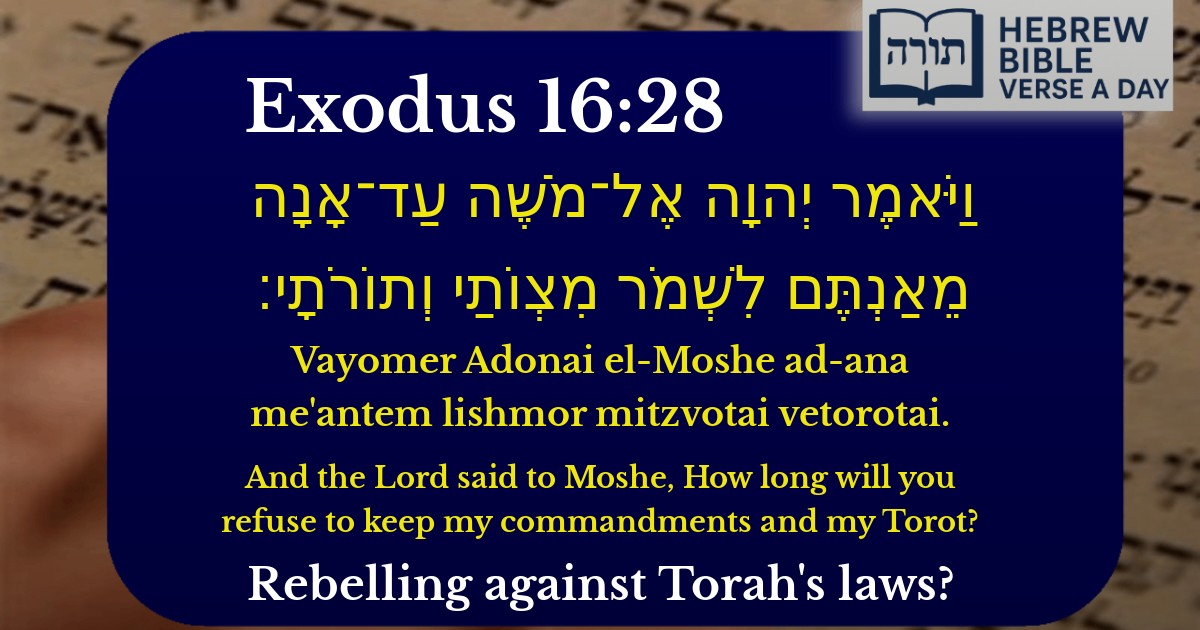Frequently Asked Questions
Q: What does 'Torot' mean in Exodus 16:28?
A: The word 'Torot' (תורתי) is plural for 'Torah,' meaning 'teachings' or 'instructions.' Rashi explains that this refers to both the Written Torah (Scriptures) and the Oral Torah (traditions and interpretations passed down). Here, Hashem is emphasizing the importance of observing all aspects of His commandments.
Q: Why was Hashem upset with the people in Exodus 16:28?
A: Hashem was displeased because the Israelites failed to observe the laws of Shabbat, despite His clear instructions. The Midrash (Shemot Rabbah 25:11) explains that this verse highlights their reluctance to fully commit to keeping the mitzvot, particularly the sanctity of Shabbat, which was a test of their faith.
Q: What lesson can we learn from Exodus 16:28 today?
A: This verse teaches the importance of faithfully observing Hashem's commandments without hesitation. The Rambam (Hilchot Teshuva 3:4) emphasizes that true commitment to Torah requires consistent action, not just intention. We must internalize that mitzvot are eternal obligations, not optional practices.
Q: How does Exodus 16:28 relate to Shabbat?
A: This verse directly follows the incident where some Israelites went out to gather manna on Shabbat, violating its laws. The Talmud (Shabbat 118b) teaches that Shabbat is a cornerstone of Jewish faith, and neglecting it shows a broader disregard for Torah. Keeping Shabbat is a sign of our covenant with Hashem.
Q: Why does Hashem address Moshe instead of the people directly in this verse?
A: Rashi explains that Moshe, as the leader, was responsible for teaching and ensuring the people followed the Torah. The Ohr HaChaim adds that Hashem spoke through Moshe to emphasize that leaders must guide their communities in mitzvah observance. This underscores the role of teachers and rabbis in transmitting Torah values.


Context of the Verse
This verse (Shemot 16:28) appears in the narrative of the manna, where Bnei Yisrael are commanded to gather a double portion on Friday and refrain from gathering on Shabbat. Despite this clear instruction, some went out to gather on Shabbat, prompting Hashem's rebuke to Moshe.
Rashi's Explanation
Rashi explains that the phrase "עד אנה מאנתם" ("How long will you refuse") is directed not only at the individuals who violated Shabbat but at the entire nation. The plural language indicates collective responsibility. Rashi further notes that the term "מצוותי ותורתי" ("My commandments and My Torot") refers specifically to the mitzvah of Shabbat and the laws of the manna, which were given as a test of faith (Shemot 16:4).
Rambam's Perspective
In Moreh Nevuchim (3:32), Rambam discusses how this incident demonstrates the importance of training oneself in emunah (faith) and bitachon (trust in Hashem). The manna was a daily miracle, yet some still lacked the patience to observe Shabbat, showing a failure to internalize divine providence.
Midrashic Insights
Grammatical Nuance
The Kli Yakar highlights the unusual phrasing "מאנתם" (from the root "מאן," meaning "to refuse") instead of a more common term like "ממרים" (rebelling). This suggests a willful, stubborn refusal rather than mere forgetfulness or error, underscoring the severity of the transgression.
Halachic Implication
The Ramban (Shemot 16:28) notes that this rebuke establishes Shabbat as a fundamental mitzvah, whose intentional violation demonstrates a rejection of the entire Torah. This aligns with the Talmudic principle (Chullin 5a) that Shabbat is equivalent to all mitzvot.